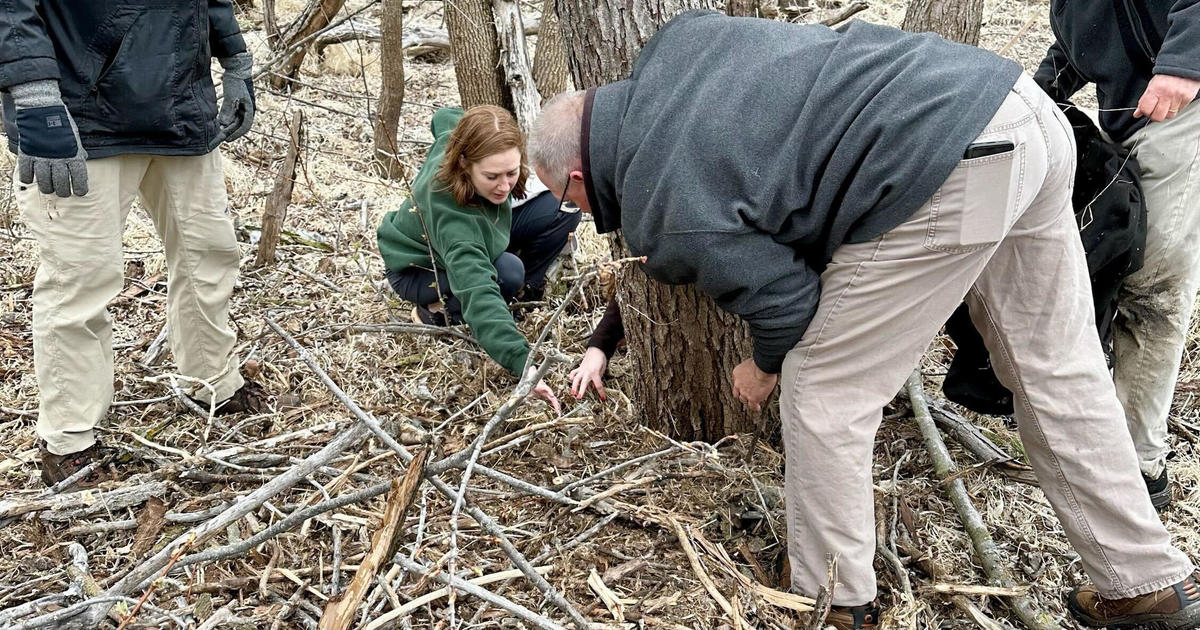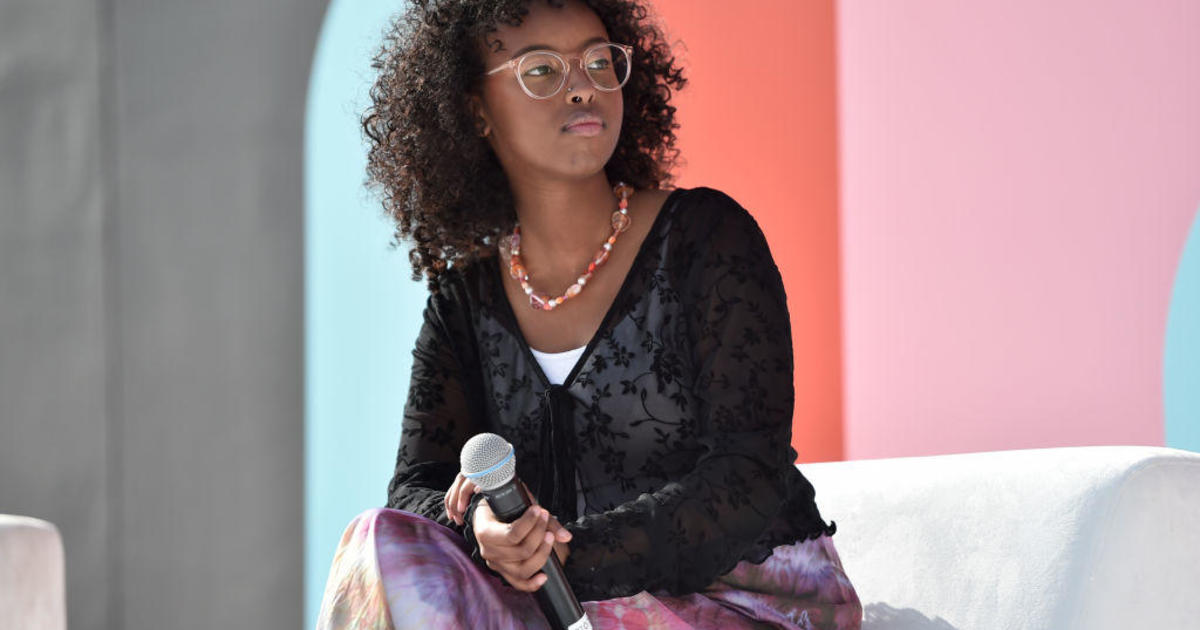Program Keeps Students Connected With Stuffed Toys
PERHAM, Minn. (AP) -- "Cheeky Charlie" gets Brianna Woltjer's classmates talking when she's not in school, even though he doesn't speak. And while he never complains, gets sick or receives bad grades, her teachers give him high marks despite being a bit of an animal.
The stuffed monkey is a familiar sight at Prairie Wind Middle School in Perham because Woltjer has Crohn's disease, a chronic condition that has kept the fifth-grader out of school almost since September, so her furry friend sits in for her in the classroom.
"It's hard sometimes when you don't see your friends or classmates, but with the monkey, you get the feeling that you have your classmates right beside you," said Woltjer, who received a "There's a Monkey in My Chair" kit, which includes "Cheeky Charlie," and a smaller version of the stuffed animal that she keeps with her at home.
Because a serious illness and extended absences can be hard for a child and their classmates to understand, St. Cloud Hospital Children's Center began offering the monkey kits to patients such as Woltjer to help her stay connected with her classmates even when she is not in school with them.
"The problem with Brianna -- or anyone with a chronic illness for that matter -- is that they miss a lot of school, and they feel a little bit ostracized," said Renae Boyle, her mother. "When a kid's gone that much, each time you come back is like the first day of school, so the monkey helps bridge that gap."
The "There's a Monkey In My Chair" program was developed by the Love, Chloe Foundation. It was designed for preschool and elementary children who are away from school because of a cancer and/or brain tumors, according to the foundation's website, but St. Cloud Hospital Children's Center has broadened the monkey kits' use and redefined who is eligible for one locally.
"It was originally created for children with cancer, but we're using it for kids who are also out of school for a long period of time, such as Crohn's kids, immune deficient kids ...," said Samantha Miller, a child life specialist at St. Cloud Hospital Children's Center.
Kits contain a big stuffed monkey that sits in the sick child's place in the classroom when he or she is unable to attend school. A smaller monkey with a backpack stays with the child. A journal, a book and a disposable camera also are provided free of charge in the kit, so that classmates or the child can use them to share with each other what is happening in and out of the classroom.
"Children learn through play, so that's one of the things that we can actually use to our advantage. When kids are playing, they feel like they can express themselves. And they feel like they don't have anything to worry about," said Rachel Calvert, a child life specialist at St. Cloud Hospital.
The backpack in the kit is intended to hold notes and drawings a sick child's classmates may have for him. The "There's a Monkey In My Chair" book was written by a parent and explains why a monkey is in the child's seat and its purpose in the classroom.
"The teacher's companion basically goes through all kinds of feelings that kids might have who are missing class, as well as ways to facilitate discussions with the missing child's classmates as to why their classmate is not there," Calvert said.
The journal in the kit can be kept by the sick child to write or draw in, or it can also be used by his classmates to write things in for the child to read. The disposable camera also can be used by either the child or his classmates. Both items are intended to keep the absent child and his classmates involved in the others' lives.
"We really want them to feel normal -- or as normal as possible -- so if they just want to write in the journal about what they had for breakfast that day, that's fine. If they want to write about why they're missing class, they can tell their class about that, which then the teacher can use to kind of facilitate a discussion," Calvert said.
Miller said, "The kit kind of provides normalcy, which is something that we try to do with all the kids that are here, whether if they are gone for a couple of days or they are gone for a month. Having a monkey and having a whole class involved is kind of empowering for a child."
Woltjer was diagnosed with Crohn's disease when she was 5. The inflammatory bowel disease causes inflammation of the lining of the digestive tract, which can lead to abdominal pain, severe diarrhea and malnutrition, according to medical experts. It is painful and debilitating, and may lead to life-threatening complications.
"I was throwing up blood, and I was cramping up a lot when I was a kid," said Woltjer, who hopes to become a doctor someday so she can find a cure for the disease.
Her father Curt, a 47-year-old stay-at-home dad, and Boyle, a 50-year-old postmaster, said they are grateful for the treatment their 11-year-old has received at the Children's Center in St. Cloud and for the monkey kit.
"It was really cool, and I just loved it because it's great for kids to enjoy," said Brianna Woltjer, who renamed the "Cheeky Charlie" she received "Georgina." ("Cheeky Charlie" is the original name of the monkey, according to its manufacturer.)
Three of the 12 monkey kits allotted to St. Cloud Hospital Children's Center have been distributed so far, including one to a child in St. Cloud and another to a child in Royalton.
"Our No. 1 goal is to make sure the child feels comfortable when they go back to school. When kids are gone for so long from school, a lot of time the kids are kind of like, `Where you've been?' or `Why do you look different?"' Miller said.
"If the child is still `involved' in the classroom and is still engaged, it kind of just makes it an easier transition for the child who has been gone for a long time. It kind of gives them more of a spotlight versus a negative reaction from the kids."
The Love, Chloe Foundation gave the Children's Center a dozen kits, which cost between $25-$35 each, so the Children's Center is looking for kit sponsors to allow the health care provider to hand out more of the kits, according to Miller.
"We do a lot of real-life, hands-on learning, a lot of small group learning, a lot of interactive learning with student groups, so when students aren't here in class, they miss all that, and that's basically impossible to recreate for students when they're gone," said Janet Knoll, principal of Westwood Elementary School.
The educator said she thought the monkey kit was a "very cool" idea for those sidelined with an extended illness, which can affect a child's social and academic development.
"Speaking for the Westwood teachers, here, I think they would be fine with that if it were clearly explained to students that this (monkey) represents a student who is not able to be with us, and we want to remember that this student is still a part of this school community and our school family here at Westwood," Knoll said.
(© Copyright 2011 The Associated Press. All Rights Reserved. This material may not be published, broadcast, rewritten or redistributed.)



